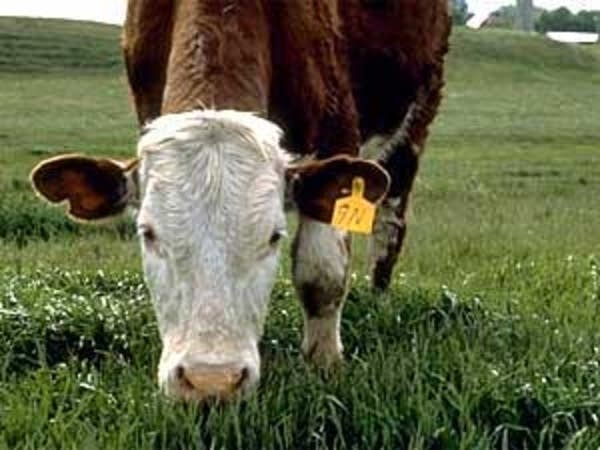Feds downgrade Minnesota's bovine TB status

The federal government has downgraded the state's status for bovine tuberculosis, meaning the state's livestock producers will have to spend more time and money to ship their cattle and bison out of state.
The new restrictions, meant to prevent the spread of the disease, take effect Wednesday. State officials had been gearing up for them since the discovery of another infected herd in February.
The restrictions will not affect animals going to slaughter or coming from herds certified as TB-free. But other animals being shipped out of state - primarily feeder cattle, breeding stock and replacement dairy cows - will have to pass tests first.
State agriculture officials told reporters in a conference call Tuesday that they're working to exempt most of the state from the restrictions except for part of northwestern Minnesota. The process will take until at least sometime this fall.
Create a More Connected Minnesota
MPR News is your trusted resource for the news you need. With your support, MPR News brings accessible, courageous journalism and authentic conversation to everyone - free of paywalls and barriers. Your gift makes a difference.
Bovine TB turned up in northwestern Minnesota in 2005, and officials have found 11 infected cattle herds since then. All of them were in Beltrami and Roseau counties. The discovery of the latest infected herd in February triggered the downgrade.
"This is a tough situation for everybody to deal with, but I think everyone in the state, not just within northwestern Minnesota, recognizes the significance of this disease, that it does require an aggressive action," said Joe Martin, the state's newly appointed bovine TB coordinator.
Consumers "are at very little risk" of contracting tuberculosis from drinking milk or eating beef, Martin stressed.
Pasteurization kills the bacteria, and the state does not allow the sale of raw milk, he said. TB rarely appears in muscle cuts of beef, but all cattle are inspected at slaughter and any showing signs of TB are condemned, he said, adding that cooking also kills the bacteria.
Martin said he doesn't have a good answer for the economic impact on the state as a whole, but he cited some numbers. He said Minnesota ships between 200,000 and 250,000 cattle to other states annually that will be subject to the new restrictions.
The tests typically cost between $5 and $10 per animal, he said, plus whatever a veterinarian charges to come out to a farm and perform them.
The Minnesota Board of Animal Health is in the process of applying to the U.S. Department of Agriculture for "split state status," which would create a special zone where the disease has been found. That would lift restrictions on the majority of the state's producers, who are outside the zone.
Linda Glasser, director of cattle programs for the board, said the state has proposed a zone that would include 300 herds in parts of Roseau, Marshall, northern Beltrami and western Lake of the Woods counties.
The state will ask the USDA to treat the rest of the state as TB-free or, failing that, subject to no more than the limited restrictions that had been in place before Wednesday.
Martin said they don't expect any problems under the new rules that would hinder dairy producers' ability to ship their milk to out-of-state processors.
Other states are free to establish tighter restrictions on Minnesota cattle than the federal requirements. North Dakota and Wisconsin already have.
Because rules can change quickly, the officials recommended that producers shipping cattle out of state call their veterinarians or the other states for their current requirements.
State officials have recommended that several county fairs in northwestern Minnesota require testing for cattle that will be exhibited, Glasser said. The Minnesota State Fair has not established its requirements, she added.
Last week, the U.S. Department of Agriculture approved $2.7 million in emergency funding to fight bovine TB in Minnesota. The money will be used to eliminate infected herds and for extra surveillance of deer, which can spread the disease between farms. The Legislature is also debating additional funding.
Ed Boggess, deputy director of the fish and wildlife division at the Minnesota Department of Natural Resources, said efforts to thin the deer herd in the affected part of northwestern Minnesota are making progress.
Sharpshooters, aerial hunters and landowners have removed 370 deer from the area since the end of the hunting season, he said. Since TB was found in Minnesota, 18 deer have tested positive while TB is suspected in four others, he said.
(Copyright 2008 by The Associated Press. All Rights Reserved.)
